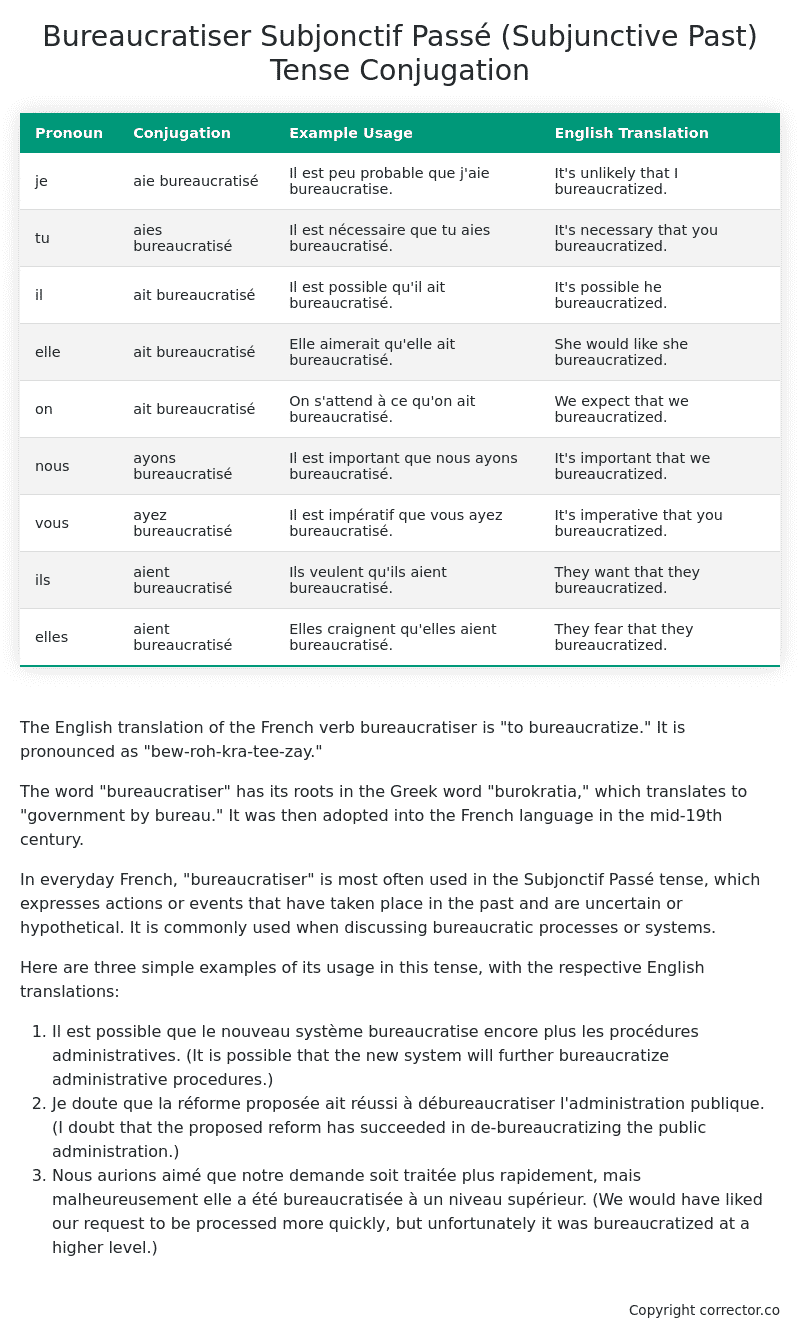Subjonctif Passé (Subjunctive Past) Tense Conjugation of the French Verb bureaucratiser
Introduction to the verb bureaucratiser
The English translation of the French verb bureaucratiser is “to bureaucratize.” It is pronounced as “bew-roh-kra-tee-zay.”
The word “bureaucratiser” has its roots in the Greek word “burokratia,” which translates to “government by bureau.” It was then adopted into the French language in the mid-19th century.
In everyday French, “bureaucratiser” is most often used in the Subjonctif Passé tense, which expresses actions or events that have taken place in the past and are uncertain or hypothetical. It is commonly used when discussing bureaucratic processes or systems.
Here are three simple examples of its usage in this tense, with the respective English translations:
- Il est possible que le nouveau système bureaucratise encore plus les procédures administratives. (It is possible that the new system will further bureaucratize administrative procedures.)
- Je doute que la réforme proposée ait réussi à débureaucratiser l’administration publique. (I doubt that the proposed reform has succeeded in de-bureaucratizing the public administration.)
- Nous aurions aimé que notre demande soit traitée plus rapidement, mais malheureusement elle a été bureaucratisée à un niveau supérieur. (We would have liked our request to be processed more quickly, but unfortunately it was bureaucratized at a higher level.)
Table of the Subjonctif Passé (Subjunctive Past) Tense Conjugation of bureaucratiser
| Pronoun | Conjugation | Example Usage | English Translation |
|---|---|---|---|
| je | aie bureaucratisé | Il est peu probable que j’aie bureaucratise. | It’s unlikely that I bureaucratized. |
| tu | aies bureaucratisé | Il est nécessaire que tu aies bureaucratisé. | It’s necessary that you bureaucratized. |
| il | ait bureaucratisé | Il est possible qu’il ait bureaucratisé. | It’s possible he bureaucratized. |
| elle | ait bureaucratisé | Elle aimerait qu’elle ait bureaucratisé. | She would like she bureaucratized. |
| on | ait bureaucratisé | On s’attend à ce qu’on ait bureaucratisé. | We expect that we bureaucratized. |
| nous | ayons bureaucratisé | Il est important que nous ayons bureaucratisé. | It’s important that we bureaucratized. |
| vous | ayez bureaucratisé | Il est impératif que vous ayez bureaucratisé. | It’s imperative that you bureaucratized. |
| ils | aient bureaucratisé | Ils veulent qu’ils aient bureaucratisé. | They want that they bureaucratized. |
| elles | aient bureaucratisé | Elles craignent qu’elles aient bureaucratisé. | They fear that they bureaucratized. |
Other Conjugations for Bureaucratiser.
Le Present (Present Tense) Conjugation of the French Verb bureaucratiser
Imparfait (Imperfect) Tense Conjugation of the French Verb bureaucratiser
Passé Simple (Simple Past) Tense Conjugation of the French Verb bureaucratiser
Passé Composé (Present Perfect) Tense Conjugation of the French Verb bureaucratiser
Futur Simple (Simple Future) Tense Conjugation of the French Verb bureaucratiser
Futur Proche (Near Future) Tense Conjugation of the French Verb bureaucratiser
Plus-que-parfait (Pluperfect) Tense Conjugation of the French Verb bureaucratiser
Passé Antérieur (Past Anterior) Tense Conjugation of the French Verb bureaucratiser
Futur Antérieur (Future Anterior) Tense Conjugation of the French Verb bureaucratiser
Subjonctif Présent (Subjunctive Present) Tense Conjugation of the French Verb bureaucratiser
Subjonctif Passé (Subjunctive Past) Tense Conjugation of the French Verb bureaucratiser (this article)
Subjonctif Imparfait (Subjunctive Imperfect) Tense Conjugation of the French Verb bureaucratiser
Conditionnel Présent (Conditional Present) Tense Conjugation of the French Verb bureaucratiser
Conditionnel Passé (Conditional Past) Tense Conjugation of the French Verb bureaucratiser
L’impératif Présent (Imperative Present) Tense Conjugation of the French Verb bureaucratiser
L’infinitif Présent (Infinitive Present) Tense Conjugation of the French Verb bureaucratiser
Struggling with French verbs or the language in general? Why not use our free French Grammar Checker – no registration required!
Get a FREE Download Study Sheet of this Conjugation 🔥
Simply right click the image below, click “save image” and get your free reference for the bureaucratiser Subjonctif Passé tense conjugation!

Bureaucratiser – About the French Subjonctif Passé (Subjunctive Past) Tense
Formation of the Subjonctif Passé
Everyday Usage Patterns
Interactions with Other Tenses
Present tense
Future tense
Conditional
Summary
I hope you enjoyed this article on the verb bureaucratiser. Still in a learning mood? Check out another TOTALLY random French verb conjugation!


